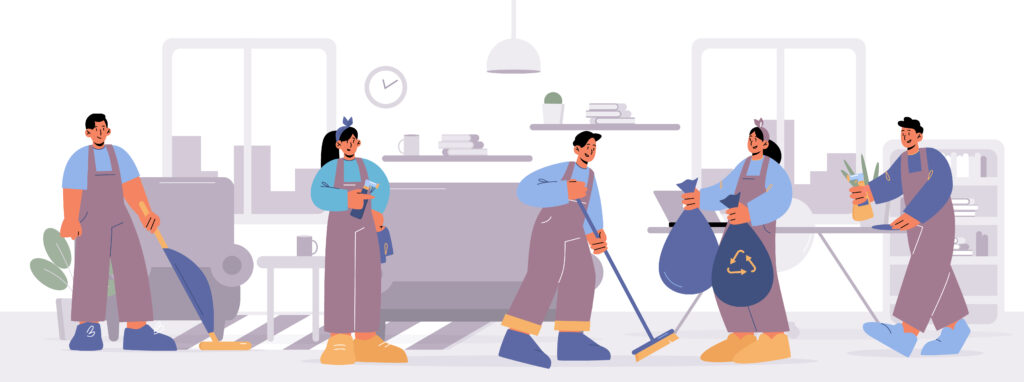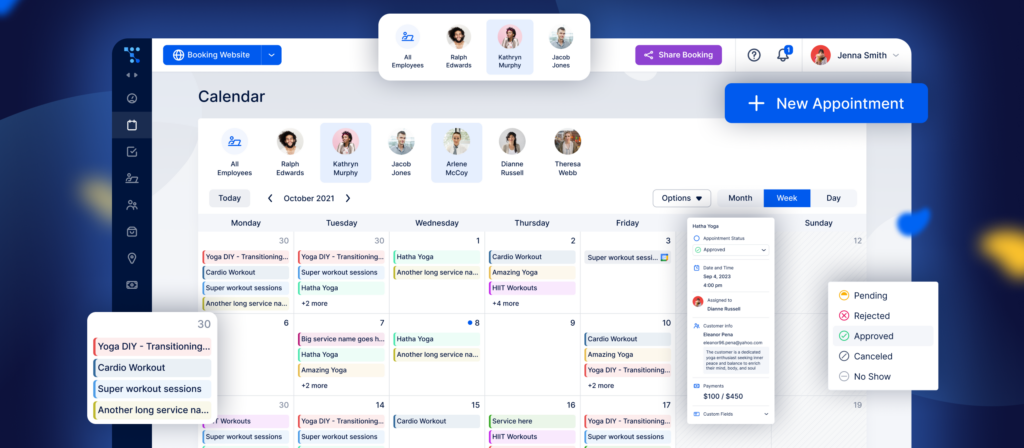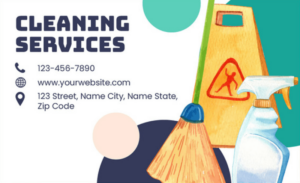The cleaning industry is vital in maintaining public health and hygiene across various environments, from residential homes to corporate facilities.
In 2022, the global cleaning services market was worth USD 370.56 billion and is expected to grow by 6.6% each year from 2023 to 2030. With this rapid growth, the cleaning industry doesn’t only create employment opportunities, but also offers entrepreneurial avenues for those looking to start their own business.
If you are among those who want to jump on this bandwagon, keep reading to discover how profitable a cleaning business is, what typical revenues and profits look like, and how much money you can potentially make in this booming industry!

Image by redgreystock on Freepik
Cleaning Business Revenue vs. Cleaning Business Profits
How much revenue can a cleaning company make?
Revenue is the total money customers pay for cleaning services. This amount can vary depending on several factors:
- Pricing Structure: The fee you charge per job or service.
- The volume of Work: How many jobs you book daily or weekly.
- Client Base: The mix of new and recurring clients you manage.
- Lead Generation: Your effectiveness in acquiring new business.
For instance, if you charge $200 for cleaning a house and perform five such jobs in a week, your weekly revenue totals $1,000.
On average, data from more than 660 franchised cleaning businesses shows an annual gross revenue of $585,000. This means they handle about 2,900 cleaning jobs per year, or roughly 12 jobs each day if they work 250 days a year.
However, revenue can greatly vary depending on factors like location, types of clients, services offered, and how efficiently the business is run.
How much profit can a cleaning business make?
Profit is what you’re left with after paying all expenses, and is a true measure of financial health. These expenses typically include:
- Labor Costs: Payments to employees or contract workers.
- Overhead Expenses: Costs like cleaning insurance, business software, and office expenses.
- Supplies and Materials: All the cleaning supplies needed for jobs.
Profit is the amount of money you’re left with after paying all of these expenses from your revenue. But, how much does a cleaning business make a year? According to national data, the salary for cleaning business owners can range from $25,500 to over $120,000 annually, proving this type of business can be quite profitable.
The key to maximizing your profit is not just to increase revenue, but to effectively manage and reduce operational costs.

Image by macrovector on Freepik
Key Factors That Determine How Profitable a Cleaning Business Is
Types of cleaning businesses (residential vs. commercial)
One of the key factors that determine the profit you’re going to make is whether you are a commercial cleaner or a residential cleaner. Let’s see what’s the exact difference, and whether owning a cleaning business is profitable.
How profitable is a commercial cleaning business?
Commercial cleaning businesses often earn more money due to the scale and frequency of the jobs involved. These businesses typically charge per square footage or the type of facility benign cleaned, which makes large-scale operations highly profitable.
If you take a 10,000-square-foot office cleaning job at an average rate of 10 cents per square foot, you could earn $1,000 per visit. However, keep in mind that the profitability of a commercial cleaning business depends on good management, getting regular clients, and using high-grade cleaning equipment to run the business successfully.
How profitable is a residential cleaning business?
Is a residential cleaning business profitable compared to a commercial cleaning business? In short, yes.
Even though it involves smaller and less frequent jobs, it is still quite profitable, especially if you try to keep overheads low and operations efficient.
Residential cleaning costs typically range from $117 to $235 per home, according to Home Advisor, with the national average sitting at $170. A solo cleaner or a small team can efficiently service multiple homes each day. If you clean five homes per week at the rate of $170, you could generate annual earnings between $44,200 and $61,100, excluding taxes and other expenses.
To maximize your residential cleaning business profits, learn how much to charge for house cleaning!
Start-up costs and initial investment
Starting a cleaning business requires an upfront investment that can vary depending on the scope and scale of operations. These are the start-up costs:
- Equipment and supplies - from $300 to $600
- Licenses and insurance - from $50 to several hundred dollars annually
- Marketing and advertising - from $135 to $650
- Employee wages - $15.87 per hour average
Pricing strategies
Effective pricing models are important for profitability and can include:
- Flat rate pricing - Charging a fixed amount per cleaning job regardless of the time it takes, often used for residential services.
- Hourly pricing - Billing based on the time spent on a job, suitable for commercial or deep cleaning.
- Square footage pricing - Is suitable for both residential and commercial cleaning, and simplifies the estimation process.
Operating expenses
Recurring costs in a cleaning business include:
- Labor costs - Salaries or wages paid to employees or contract workers.
- Supplies and maintenance - Ongoing expenses for cleaning products and equipment maintenance.
- Marketing and customer acquisition - Continuous investment in marketing strategies to maintain and grow the customer base.
Market demand and trends
Marketing trends and demands are ever-changing, and you need to understand dynamics and anticipate future trends to have a sustaining and growing cleaning business. Factors to consider include:
Understanding current market dynamics and future trends is essential for sustaining and growing a cleaning business. Factors to consider include:
- Evolving customer preferences - Increasing demand for eco-friendly cleaning products and practices.
- Technological advancements - Adoption of new technologies like automated booking systems and customer relationship management (CRM) tools.
- Economic indicators - How economic shifts influence residential and commercial cleaning demands.
Average Monthly and Yearly Earnings of Cleaning Businesses
How much a cleaning business makes a year and a month greatly depends on the type and scale of operations. Here’s a general breakdown:
- Commercial cleaning businesses - These typically have higher potential because of the scale of the jobs, and square footage prices. Commercial cleaning businesses can start around $70,000 a year but have the potential to exceed $100,000 with an established client base and efficient operations.
- Residential cleaning business - Smaller residential businesses can earn between $36,000 to $100,000 annually. If you gradually expand the team, the income can increase considerably, with potential earnings reaching upwards of $70,000 annually as the business stabilizes and grows its customer base.
The number of hours and the ability to hire additional employees are key factors in growing both residential and commercial cleaning businesses. When from working solo you jump to a team, cleaning business revenue can increase drastically.
For example, expanding from working alone to having a team can increase a business's earnings from $50,000 to $70,000 or more each year.

Sources of Cleaning Business Revenue
Regular clients
Regular clients who book weekly or bi-weekly provide a consistent income. These clients provide predictable cash flow and allow you to plan financially and allocate resources.
One-time services
These services are provided on a non-recurring basis, such as move-out cleanings or post-construction cleanups. These are usually priced higher because they’re scheduled on short notice, which increases revenue but makes it less consistent.
Add-on services
Clients can choose additional services such as appliance cleaning, window washing, or carpet cleaning. These services will add price to the average payment, increasing overall revenue and providing more cleaning options to meet diverse client needs.
Seasonal Fluctuations in Revenue
Cleaning businesses often experience seasonal variations in demand. Some times of the year people are looking for deep cleanings or pre-holiday cleanings, while other seasons have decreased in demand. Some of them include:
- Spring cleaning - A surge in demand during spring cleanings can result in increased bookings. This is the time of the year when people undertake comprehensive cleanings, such as carpet cleaning, cabinet cleaning, and window washing, and want their homes to sparkle.
- Holiday seasons - Before major holidays such as New Year or Christmas, demand for cleanings increases as people prepare for family gatherings.
- Winter and summer slowdown - In some regions, demand might decrease in winter or summer months. Due to severe temperatures, people are not moving in or out, and don’t practice renovation activities.
Keeping in mind seasonal demands, you can prepare for busy periods by adjusting resources and planning schedules, and plan for slower periods by offering different services or improving marketing.
Tips for Improving Profitability
Marketing strategies to attract more clients
To increase your cleaning business’s profits, you need to think about marketing and advertising.
Social media platforms, SMS marketing platforms, Google Ads, and a website can significantly increase your advertising powers, and attract new clients. Offline methods are also useful for clients who don’t surf the internet much. Design business cards, place an ad in a local newspaper, or attend gatherings in your community. We’ve explained advertising your cleaning business in great detail, so don’t forget to read about it!
Streamlining operations for cost savings
As we said before, increasing your revenue is not just increasing the prices of your service. You need to be strategic with operational expenses.
What does that exactly mean? Get software that eases the booking process, manages employees' schedules, sends invoices, and manages taxes.
You might wonder if software like this exists? Yes, that’s Trafft!
Cleaning service software you'll love!
Trafft is a cleaning booking software that easily integrates with your website, or creates a dedicated booking page with a custom domain, in case you don’t have a website.
But how does Trafft enhance your operation?
Clients can choose their preferred cleaning timeslot, add extra service, and create a personal profile to track their bookings - at any time of the day or night! Additionally, Trafft allows you to send SMS and email notifications to clients about their upcoming appointments, helping to prevent no-shows.
Clients can pay online through PayPal, Mollie, Stripe, and Authorize.Net, ensuring a variety of secure payment options for their convenience.
The best of all is that Trafft is free for up to five users!
Check out all of Trafft’s awesome features.
Investing in technology and tools for efficiency
Investing in technology and tools can drastically increase your profits if you use them right. A booking system that is also a management system such as Trafft can enhance your operations beyond basic scheduling.
Trafft helps you manage employee roles, set company holidays, and handle multiple service bookings. You can also adjust appointment details, update statuses, and offer coupons and discounts to your clients, improving both efficiency and customer interaction.
So, Is Owning a Cleaning Business Profitable?
Yes, in a blooming market that is predicted to grow in the coming years, owning a cleaning business can be quite profitable. The industry’s growth is driven by rising demand in various sectors, which offers many opportunities for you as an entrepreneur.
With the right approach, including effective cost management and the utilization of technology, both your revenue and profit can rise through the roof!
FAQ about Cleaning Business Revenue and Profit
What type of cleaning business makes the most money?
What is the most profitable cleaning business is a question any novice entrepreneur asks. Commercial cleaning services generally generate higher revenue than residential cleaning services. This is due to larger-scale operations and the ability to charge more per job, especially for jobs that require specialized skills or equipment.
What is the profit margin for a cleaning business?
The profit margin for a cleaning business can vary widely, typically ranging from 10% to 28%. This margin depends on several factors such as the type of services provided, operational efficiency, and the cost management strategies of the business.
What is the biggest cost in the cleaning industry?
The biggest costs in the cleaning industry are usually related to labor, supplies, and equipment. Labor costs can vary significantly depending on the region and the structure of the business, whether it involves hiring employees or subcontractors. Supplies and equipment costs also represent a substantial part of the expenses, especially for businesses that offer specialized cleaning services.
Looking for More Cleaning Business Resources?
For more tips and tricks on how to start, manage, and grow your cleaning business, check out the following articles:
- How to Run a Successful Cleaning Business [Actionable Tips]
- Grow Your Cleaning Business
- How to Get Clients for Your Cleaning Business
- Best Scheduling Software for Cleaning Business
- How Much to Charge for Commercial Cleaning
- How Much to Charge for House Cleaning







